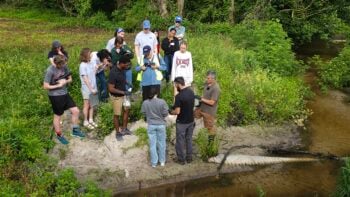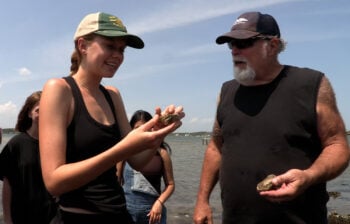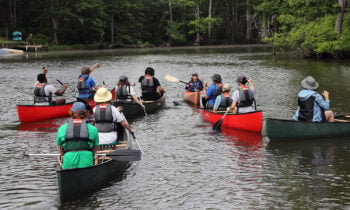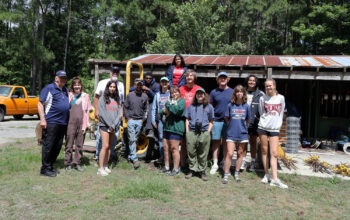Catawba College and Waterkeeper Alliance Partner Again on Advocacy Boot Camp 2024
By: Waterkeeper Alliance

The Catawba College Center for the Environment-Waterkeeper Alliance Clean Water Advocacy Boot Camp recently concluded. This unique and immersive ten day-course afforded students the opportunity to learn both in the classroom and in the field.
Things kicked off on Sunday, May 6, when 14 students (12 from Catawba College and two from Wake Forest University) along with two faculty members arrived in New Bern, NC. The next day, students hit the ground running, while also taking to the skies for flyovers. On the way to the Duplin County Airport, the group spotted two sprayers close to the road. Students were able to exit the vans and experience the odor from the sprayers. From there, they took to the sky to get a birds eye view of the situation. A total of six flights took place, providing the students with eye-opening exposure to what advocates do. Special thanks to SouthWings for helping facilitate this opportunity.
Students later met with Rev. Jimmy Melvin, who provided a feel for what impacted communities must endure living near CAFO facilities. During the flights, the airplanes went to the specific GPS for Rev. Melvin’s church to see how close the encroachment really is and to see why the well at the church had to be extended deeper to avoid contamination.
Next up was a ground tour. The group stopped at a designated location to get up close and personal with the smell emanating from a nearby CAFO. During the stop, the farm owner approached the group. The owner had agreed to talk, though at times it felt more like yelling. Nevertheless, this was the first time this owner has agreed to speak with clean water advocates and it may open up the possibility for future dialogue. 
The following day, Tuesday, included a water sampling demonstration led by Christian Breen of Waterkeeper Alliance and Kemp Burdette of Cape Fear Riverkeeper. The group sampled from Stocking Head Creek, which Kemp recently got added to the 303(d) list. Christian explained the sampling process and had several students assist. Kemp discussed the implications and challenges for getting a water body listed on the 303(d) list and what steps he is taking now that the creek is listed. This was a very interesting aspect of advocacy for the students and they had many questions for both Christian and Kemp.
Later that day, the students met with Mary Lee, a legislative assistant to Representative Pricey Harrison. Though Harrison could not attend, Mary Lee did a great job portraying the office’s positions regarding the environment. Later, the students met with Representative Jimmy Dixon. He was originally scheduled to speak for 15 minutes, but talked for closer to an hour and a half, and mostly about himself. The students were quick to pick up on Rep. Dixon’s agenda and how he protected the CAFO industry. The students had questions that Rep. Dixon just didn’t answer, or his answers were not direct and they were very frustrated. Several students want to arrange another meeting with Rep. Dixon, on their own, to get questions answered.
On Wednesday, the bootcamp began focusing on fisheries, both commercial and recreational. The first stop was Downeast Mariculture, where students toured a commercial oyster hatchery in Wilistoon, NC. This facility supplies “naturally grown” oysters from larvae to approximately 1” in size. The oysters are raised using a water circulation system which utilizes water directly from Jarrett Bay. Once oysters reach approximately 1” in size, they are sold to local oystermen who relocate them to natural oyster beds throughout eastern North Carolina. Students were fascinated by this process, which not only provided oysters for eventual sale and consumption, but also provided oysters with a healthy start to later become water filters.
 The next stop was Hooper Family Seafood, where the group learned the important role that clams play in the ecosystem. Students waded out into the Middens Creek which connects to the Core Sound of the Outer Banks.They learned about the process of raising clams commercially.
The next stop was Hooper Family Seafood, where the group learned the important role that clams play in the ecosystem. Students waded out into the Middens Creek which connects to the Core Sound of the Outer Banks.They learned about the process of raising clams commercially.
Later, at Oysters Carolina, students were given a view into an active oyster farm. Aside from learning about the many ecological benefits oysters can provide, the group was also offered fresh oysters to eat. At least a few students were able to try their very first raw oyster.
Rounding out the day was a visit with Chris Elkins who works as a recreational fisherman. Chris discussed the impacts on the coastal waters, primarily from sedimentation but also pointed out the upstream impact from CAFOs as a significant problem. Chris also highlighted the changes in the water quality he has witnessed from his dock over the past decades.
 On the following day, the students got to spend time on the Neuse River. Sam Krop, Neuse Riverkeeper, took the students on a paddle trip toward Goose Creek where cypress and tupelo trees are estimated to be over 1,000 years old. Sam discussed the many issues the Neuse River faces, including upstream impacts from Raleigh, sediment, development, and, of course, CAFOs. Some of the students had never paddled a canoe, but once they got the hang of it, were able to keep up with Sam. All the students indicated that it was a great learning experience to hear from a Waterkeeper in their watershed and on one of the water bodies they work to protect.
On the following day, the students got to spend time on the Neuse River. Sam Krop, Neuse Riverkeeper, took the students on a paddle trip toward Goose Creek where cypress and tupelo trees are estimated to be over 1,000 years old. Sam discussed the many issues the Neuse River faces, including upstream impacts from Raleigh, sediment, development, and, of course, CAFOs. Some of the students had never paddled a canoe, but once they got the hang of it, were able to keep up with Sam. All the students indicated that it was a great learning experience to hear from a Waterkeeper in their watershed and on one of the water bodies they work to protect.
Later that day, the students heard from John Wathen, Hurricane Creekkeeper, who joined the group via Zoom. John explained his involvement in the Deep Water Horizon catastrophe and also his involvement during the Standing Rock events. As always, John was a captivating speaker and did not disappoint.
On Saturday, the group visited Shenk’s Farm, a sustainable/regenerative agriculture operation on approximately 50 acres. Students spent hours touring the farm by foot to see how animals can be raised in a natural setting. They were taken to the area of woods where the hogs run free and, in the process, help spread their waste more evenly across an area, thereby “regenerating” the soil. The students also saw open range chickens.
 The students were given Sunday off, but were back at it on Monday, their last full day of bootcamp. A highlight was the Riverkeeper Roundtable that included Riley Lewis of White Oak Riverkeeper, Emily Sutton of Haw Riverkeeper, and Jeff Currie of Lumber Riverkeeper. Students heard about what the life of a Waterkeeper looks like, the challenges they face, and how they became the strong advocates they are to this day. Students were then given the opportunity to spend one-on-one time with the three Waterkeepers to discuss potential internships.
The students were given Sunday off, but were back at it on Monday, their last full day of bootcamp. A highlight was the Riverkeeper Roundtable that included Riley Lewis of White Oak Riverkeeper, Emily Sutton of Haw Riverkeeper, and Jeff Currie of Lumber Riverkeeper. Students heard about what the life of a Waterkeeper looks like, the challenges they face, and how they became the strong advocates they are to this day. Students were then given the opportunity to spend one-on-one time with the three Waterkeepers to discuss potential internships.
On the final evening, the entire group sat around the campfire. The students discussed what they had learned, what they thought of being an advocate, and what their future plans included once they finished school.
Photo credit: Aimee Trom